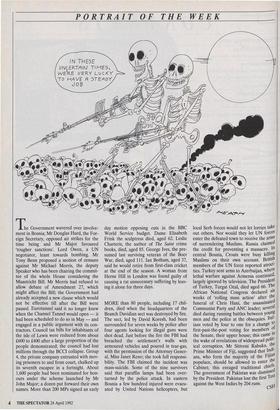PORTRAIT OF THE WEEK
The Government wavered over involve- ment in Bosnia; Mr Douglas Hurd, the For- eign Secretary, opposed air strikes for the time being and Mr Major favoured `tougher sanctions'. Lord Owen, a UN negotiator, leant towards bombing. Mr Tony Benn proposed a motion of censure against Mr Michael Morris, the deputy Speaker who has been chairing the commit- tee of the whole House considering the Maastricht Bill. Mr Morris had refused to allow debate of Amendment 27, which might affect the Bill; the Government had already accepted a new clause which would not be effective till after the Bill were passed. Eurotunnel said it no longer knew when the Channel Tunnel would open — it had been scheduled to do so in May — and engaged in a public argument with its con- tractors. Council tax bills for inhabitants of the isle of Lewis were reduced from about £600 to £400 after a large proportion of the people demonstrated; the council had lost millions through the BCCI collapse. Group 4, the private company entrusted with mov- ing prisoners to and from court, chalked up its seventh escapee in a fortnight. About 1,600 people had been nominated for hon- ours under the scheme launched by Mr John Major; a dozen put forward their own names. More than 200 MPs signed an early day motion opposing cuts in the BBC World Service budget. Dame Elisabeth Frink the sculptress died, aged 62. Leslie Charteris, the author of The Saint crime books, died, aged 85. George Ives, the pre- sumed last surviving veteran of the Boer War, died, aged 111. Ian Botham, aged 37, said he would retire from first-class cricket at the end of the season. A woman from Herne Hill in London was found guilty of causing a rat unnecessary suffering by leav- ing it alone for three days.
MORE than 80 people, including 17 chil- dren, died when the headquarters of the Branch Davidian sect was destroyed by fire. The sect, led by David Koresh, had been surrounded for seven weeks by police after four agents looking for illegal guns were shot dead. Just before the fire the FBI had breached the settlement's walls with armoured vehicles and poured in tear-gas, with the permission of the Attorney Gener- al, Miss Janet Reno; she took full responsi- bility. The FBI claimed the incident was mass-suicide. Some of the nine survivors said that paraffin lamps had been over- turned by the police attack. In eastern Bosnia a few hundred injured were evacu- ated by United Nations helicopters, but local Serb forces would not let lorries take out others. Nor would they let UN forces enter the defeated town to receive the arms of surrendering Muslims. Russia claimed the credit for preventing a massacre. In central Bosnia, Croats were busy killing Muslims on their own account. British members of the UN force reported atroci- ties. Turkey sent arms to Azerbaijan, where lethal warfare against Armenia continued, largely ignored by television. The President of Turkey, Turgat Ozal, died aged 66. The African National Congress declared six weeks of 'rolling mass action' after the funeral of Chris Hani, the assassinated Communist Party and ANC leader; several died during running battles between young men and the police at the obsequies. Ital- ians voted by four to one for a change to first-past-the-post voting for members of the Senate, their upper house; this came .111 the wake of revelations of widespread pollt" ical corruption. Mr Sitiveni Rabuka, the Prime Minister of Fiji, suggested that Indi- ans, who form the majority of the Fijian populace, should be allowed to enter the Cabinet; this enraged traditional chiefs. The government of Pakistan was dismissed by the President. Pakistan lost the first Test against the West Indies by 204 runs.
cso


























































 Previous page
Previous page